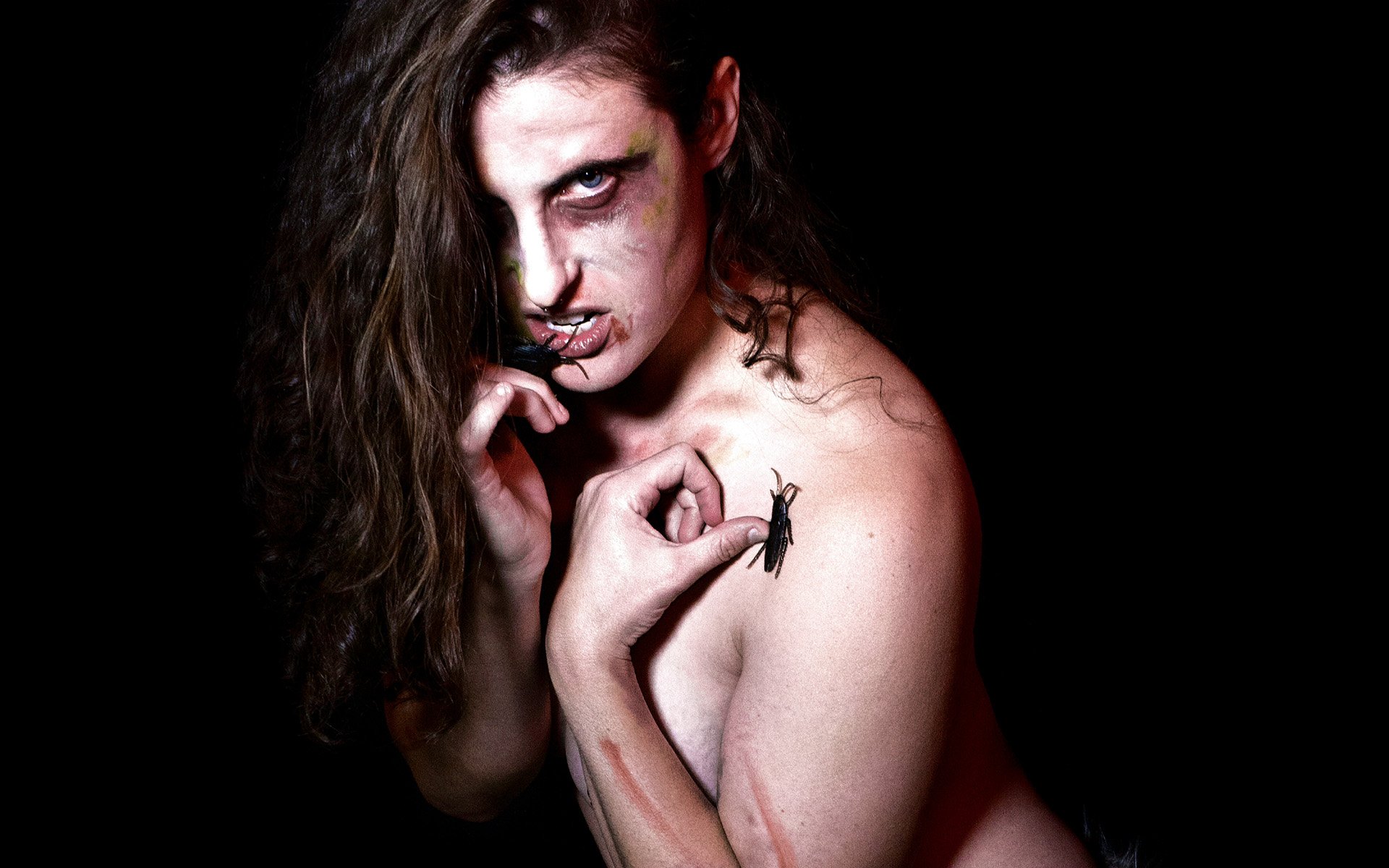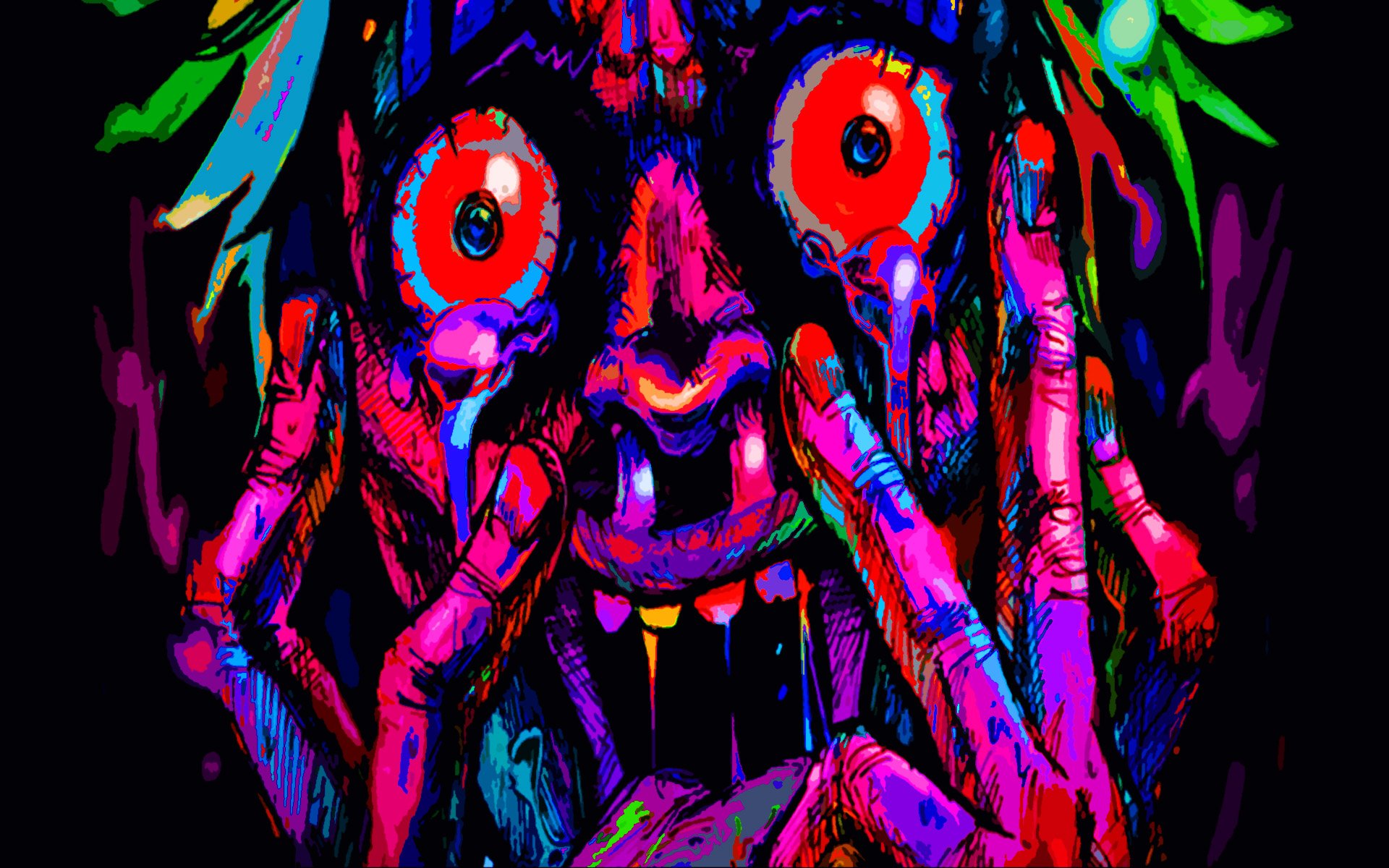Force of Nature Productions presents Fallen Saints: Salem Review

Actors Workout Studio, North Hollywood, CA
For years, I've been getting emails from Force of Nature Productions detailing all the great theatrical shows they do. Much like nearby Zombie Joe's Underground Theatre (very nearby... just a few minute's walking distance from Zombie Joe's to FoN's Actors Workout Studio on Lankershim Blvd), this theater company first gained my attention because of coverage on their Halloween-centric show. In addition, they've also been featured as an attraction at Midsummer Scream for the past few years, bringing said example of horror theater to a broader audience at Southern California's premiere Halloween convention. But it wasn't until this season that I finally had the chance to see Fallen Saints for myself, and witness the haunting and intricate study of horror that they bring.
(Image courtesy of Force of Nature Productions.)
Fallen Saints is FoN Productions' Halloween season anthology. In its fourth season, this series tells stories that are not directly related to each other, but they all occupy the same mythological universe. The first iteration in 2016 was entitled "Whitechapel" and focused on Jack the Ripper. Season two's "Día de los Muertos" explored the legend of La Llorona and her hideous tragedy. Last year, Fallen Saints: Dark delved deeper into the entity that binds the Fallen Saints series together--the character of Darkness, who represents evil but is not actually evil herself, at least so she would claim. This Lucifer-like being can taken on many shapes and appearances, but she never actually commits acts of atrocity. Instead, she is the conductor who nudges the strings of the weak and the corruptible, pushing them to the heinous deeds detailed in each story. The insidous portrayal by Gloria Galvan--the only actor to appear in all four Fallen Saints installments--is devious and haunting, distilled with the bravado of someone who doesn't consider herself the antagonist, even though she leads many antagonistic deeds.
This season, Fallen Saints takes us to 1600s New England to explore the uncertainty and malleability of the human spirit through fear and paranoia in its 2019 production, "Salem." As one might expect, the horrific nature of the Salem Witch Trials makes for a fascinating study of the human condition. It juxtaposes the classic, fairytale perception of evil as this ominous, sinister, supernatural caricature against its most common true form--the actions of fallible human beings driven by false belief and self-justification of the harmful acts they commit.
(Photo by Patty Mo and courtesy of Force of Nature Productions.)
Fallen Saints: Salem opens with guests being led through the door of the Actors Workout Studio and into the first room, where they are seated on risers facing a bedroom scene from colonial America. A young girl eats her supper with a cold, joyless repose, while her mother cleans and sets items away before evening's end. Along the way, they pass a gentleman scribbling writings by candlelight, as well as the nighttime serenade of the beckoning wilderness nearby. It's an artful transition from modern day to the 1600s, and it sets the uneasy tone of the entire play beautifully.
(Photo by Patty Mo and courtesy of Force of Nature Productions.)
Once everyone is seated, the show begins, with the actors transitioning immediately into the scene. Young Betty finishes her meal and gets ready for bed, while her mother, Elizabeth, finishes cleaning. Her father, Reverend Samuel, the gentleman writing what turns out to be a sermon, comes in to complain about "Annabelle," who has been disturbing Samuel's focus with her wails. But Elizabeth quiets the off-stage girl down, and the parents exit, leaving Betty to her bed by herself.
And that is when the supernatural emerges. The audience quickly discovers the reason for Betty's unhappy disposition. An unseen force quickly envelopes her, pinching, scratching, and grabbing at her with invisible hands, possessing her with panic and despair. Her screams elicit the return of her parents, and helpless before the spirit that seems to be haunting their child, their concern manifests into fear and the first bits of a paranoia that will consume the family and eventually the townspeople.
(Photo by Patty Mo and courtesy of Force of Nature Productions.)
Guests move from Act I in the bedroom to a chapel in Act II, as the Reverend Samuel assembles the townspeople who have heeded his call to congregate in the local church in the early morning hours, in order to discuss this threat that is now posing peril to the town's children. Samuel exposits his suspicions and finally proclaims the unspeakable fear--a witch is lurking amongst the village, secretly poisoning and harming its future, the children of the town!
(Photo by Patty Mo and courtesy of Force of Nature Productions.)
Not unsurprisingly, the tense situation worsens after Samuel announces that he has had unseen assistants barricade the church from the outside until the group gathered before him agrees to pursue and vanquish this malevolent threat. Innocent Betty is brought out, showing wounds and scars from the lashings of her supernatural attack, and set upon to identify a culprit. In her anxiety and her helplessness, she is manipulated by her father to place an accusation, and as anyone with any knowledge of what happened in Salem can guess, the fear and suspicion lead to death, followed by justification for this heinous action, followed by further paranoia after the first death fails to eliminate Betty's attacks, which manifest with terrifying ferocity before the group's very eyes. By the end of the 41 minute play, senseless death has been carried out, and those that remain are left to deal with the devastating actions they have wrought.
Fallen Saints: Salem serves as an all-too-real allegory for the consequences of succumbing to dread and alarm brought upon by a cult-like figure preaching protection from evil as a front to actions that actually bring harm to innocent bystanders. The townspeople claim to act in the name of goodness, but their trepidation and response to the inexplicable attacks on Betty lead them to terrible deeds, worsened by their attempts to justify them in the name of their beliefs, by their manipulation of their truths in witness to what has just occurred. If this seems to relate to current day events and the modern political climate, the reference isn't exactly coincidental. As Darkness implies in her soliloquy to close the show, true evil isn't necessarily a fantastical beast borne in tales and writing. It can be the darkness of man who defends a crime as a necessary part of preserving that which is good.
(Photo by Patty Mo and courtesy of Force of Nature Productions.)
As a piece of horror theater, Fallen Saints is less about startle scares and more about a creeping, uncomfortable psychological progression of good people twisted into supporting bad things. From the moment the play begin, the tension of the environment around Salem is palpable, and it only thickens and worsens as the narrative progresses. Allegra Rodriguez Shivers lays a cutting energy of dread as the helpless Betty rendered into torment and suffering. Heide Appe's Elizabeth instills the cool and unflinching demeanor as a stoic Puritan wife who yearns to be able to express her true emotions. And Jerry Chappell's dramatic Samuel demonstrates the subtle and subconsciously deceptive twistings of villainy, as his dismay toward the attacks and panic over his daughter's safety wrench him deeper and deeper into his doctrines, but lead to greater and greater tragedy as a result.
On the villagers’ side, Kyle Felts’ Giles instills a moral compass with his outrage and questioning over Reverend Samuel’s dogmatic claims, while Jeffrey Boulton’s Thomas counterbalances as the devoted follower who all too easily embraces the the explanation that comes with fear. Their struggle with each other through the play presents an interesting parallel to the secular and the Evangelical in today’s society. Noleen Acosta as Gile’s wife, Martha, is caught between her loyalty to her less than all-believing husband and her faith in the community and the church, and her internal strife reflects in every expression and anguish she projects in trying to follow what’s right, based on what has been presented before her. And Brie Zepeda’s Sarah presents a tragic victim of the paranoia—a loving mother who is sacrificed to the fervor in the name of false righteousness.
(Photo by Patty Mo and courtesy of Force of Nature Productions.)
Fallen Saints: Salem never really breaks the wall of interactivity to be a true example of immersive theater, but it's a performance that can speak to the heart and soul of each audience member. Captive in the embrace of fear and a yearning for security, to what lengths is one willing to go in order to assure safety and well-being? Does this mean eliminating any threat, or even any potential for threat? And how does one accept the results when this effort becomes horrific?
These are insightful and inciteful questions posed by Fallen Saints, and they result in a thrilling and distressing show that leaves the audience breathless by the time it polishes its dramatic climax. Guests file out of the second performance space and back into modern day North Hollywood, leaving a shattered Salem to try to make sense of the violence that has been shorn under the shroud of darkness. Kudos go to writer, Kerry Kazmierowicztrimm, and director, Sebastian Muñoz for orchestrating a masterful lesson on the persuasive and sometimes deadly fallibility of man.
(Photo by Patty Mo and courtesy of Force of Nature Productions.)
My first viewing of a Fallen Saints or Force of Natures Productions show left me regretful for having waited this long to finally attend a performance. The acting, soundscape, and spartan stage settings added up to a truly forceful rendition of a familiar story in all its most intimate and wresting forms. Though I didn't realize it, this fourth iteration of Fallen Saints also contained easter eggs and references to past performances, from the allusion to "Abigal" (a past character) to the reappearance of Bridgette, one of the townspeople and first to be incorrectly accused as being the witch, as Darkness herself. One doesn't need to have seen a previous show to enjoy the story, but there are nods to the returning fans.
(Photo by Patty Mo and courtesy of Force of Nature Productions.)
Unfortunately, Fallen Saints has concluded its run for this season. Back into the fog it goes. We'll have to wait until presumably next Midsummer Scream to glimpse the next installation. But Force of Nature Productions puts on plenty of great plays year-round--some dramatic, some comedic. The next production is Romeo and Juliet in Hell, a comedy written and directed by Matt Ritchey, telling what happens when Romeo and Juliet wake up dead and in hell and must escape by navigating a series of Shakespearean tropes with inside jokes and commentary on their life story. There will be eight performances, Friday and Saturday evenings at 8:00pm from November 1 - 23. Tickets can be purchased online, and additional information can be found on Force of Nature Productions' web site.
Wonderful theater is all around us, especially in a hotbed like North Hollywood. These intimate performances are riveting and and exciting, just as big Broadway-style productions are, and it's great to see this creativity shared with the viewing public!
Architect. Photographer. Disney nerd. Haunt enthusiast. Travel bugged. Concert fiend. Asian.













